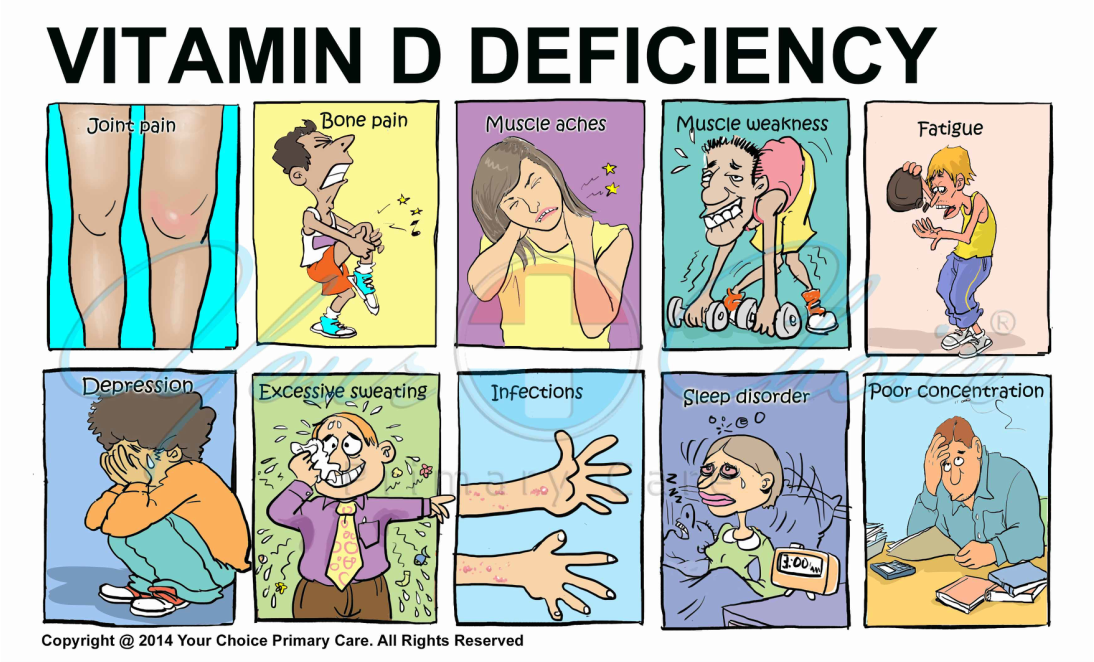If you shun the sun, suffer from milk allergies, or adhere to a strict vegan diet, you may be at risk for vitamin D deficiency. Known as the sunshine vitamin, vitamin D is produced by the body in response to skin being exposed to sunlight. It is also occurs naturally in a few foods including some fish, eggs and in fortified dairy and grain products.
Vitamin D is essential for strong bones, because it helps the body use calcium from the diet. Traditionally, vitamin D deficiency has been associated with rickets, a disease in which the bone tissue doesn't properly mineralize, leading to soft bones and skeletal deformities. But increasingly, research is revealing the importance of vitamin D in protecting against a host of health problems.
Some of the signs and symptoms of Vitamin D deficiency are:
- Joint pain
- Bone pain
- Muscle aches
- Muscle weakness
- Fatigue
- Depression
- Excessive sweating
- Infections
- Sleep disorder
- Poor concentration
However, for many people, the symptoms are subtle. Yet, even without symptoms, too little vitamin D can pose health risks. Low blood levels of the vitamin have been associated with the following:
- Increased risk of death from cardiovascular disease
- Cognitive impairment in older adults
- Severe asthma in children
- Decreased Immunity
- Cancer
When to see a doctor
Make an appointment with your primary care doctor if you have signs and symptoms of vitamin D deficiency.
Research suggests that vitamin D could play a role in the prevention and treatment of a number of different conditions, including diabetes, hypertension, and multiple sclerosis.
Causes of Vitamin D Deficiency
- You don't consume the recommended levels of the vitamin over time. This is likely if you follow a strict vegan diet, because most of the natural sources are animal-based, including fish, eggs, fortified dairy products.
- Your exposure to sunlight is limited. Because the body makes vitamin D when your skin is exposed to sunlight, you may be at risk of deficiency if you are homebound, live in northern latitudes, wear sunscreen, or have an occupation that prevents sun exposure.
- You have dark skin. The pigment melanin reduces the skin's ability to make vitamin D in response to sunlight exposure. Some studies show that older adults with darker skin are at higher risk of vitamin D deficiency.
- Your kidneys cannot convert vitamin D to its active form. As people age, their kidneys are less able to convert vitamin D to its active form, thus increasing their risk of vitamin D deficiency.
- Your digestive tract cannot adequately absorb vitamin D. Certain medical problems, including Crohn's disease, cystic fibrosis, and celiac disease, can affect your intestine's ability to absorb vitamin D from the food you eat.
- You are obese. Vitamin D is extracted from the blood by fat cells, altering its release into the circulation. People with a body mass index of 30 or greater often have low blood levels of vitamin D.
The most accurate way to measure how much vitamin D is in your body is the 25-hydroxy vitamin D blood test.
Treatment for vitamin D deficiency involves getting more vitamin D through supplements. Your doctor will recommend appropriate amount of supplements based on your vitamin D level and health conditions.
If you don't spend much time in the sun or always are careful to cover your skin (sunscreen inhibits vitamin D production), talk to your doctor about taking a vitamin D supplement, particularly if you have risk factors for vitamin D deficiency.


